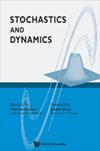Averaging principle for stochastic 3D generalized Navier–Stokes equations
IF 0.8
4区 数学
Q3 STATISTICS & PROBABILITY
引用次数: 0
Abstract
In this paper, the multiscale stochastic 3D generalized Navier–Stokes equations are studied. By using Khasminkii’s time discretization approach and the technique of stopping time, the strong averaging principle for stochastic 3D generalized Navier–Stokes equations is proved in the space .
随机三维广义纳维-斯托克斯方程的平均原理
本文研究了多尺度随机三维广义纳维-斯托克斯方程。通过使用 Khasminkii 的时间离散化方法和停止时间技术,证明了随机三维广义 Navier-Stokes 方程在ℍ1(𝕋3)空间的强平均原理。
本文章由计算机程序翻译,如有差异,请以英文原文为准。
求助全文
约1分钟内获得全文
求助全文
来源期刊

Stochastics and Dynamics
数学-统计学与概率论
CiteScore
1.70
自引率
0.00%
发文量
49
审稿时长
>12 weeks
期刊介绍:
This interdisciplinary journal is devoted to publishing high quality papers in modeling, analyzing, quantifying and predicting stochastic phenomena in science and engineering from a dynamical system''s point of view.
Papers can be about theory, experiments, algorithms, numerical simulation and applications. Papers studying the dynamics of stochastic phenomena by means of random or stochastic ordinary, partial or functional differential equations or random mappings are particularly welcome, and so are studies of stochasticity in deterministic systems.
 求助内容:
求助内容: 应助结果提醒方式:
应助结果提醒方式:


